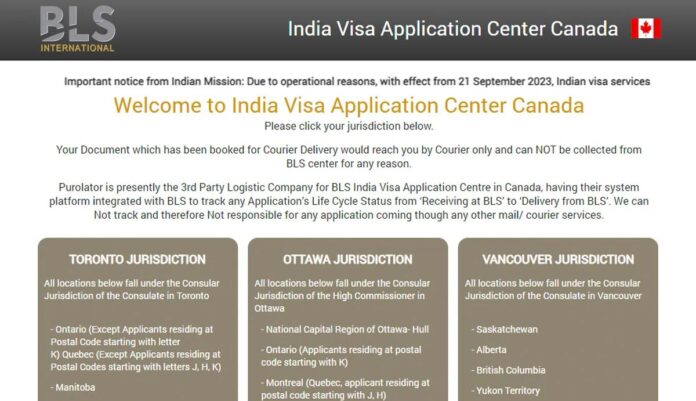India on Thursday suspended issue of visas to citizens of Canada “till further notice”. A notice by BLS International – a private agency hired for initial scrutiny of visa applications of Canadian nationals – said “Due to operational reasons… Indian visa services have been suspended till further notice”.
This comes as India and Canada are locked in an international row over Ottawa’s claim it has “credible allegations” linking agents of New Delhi to the murder of Hardeep Singh Nijjar, a pro-Khalistan Sikh terrorist. The Indian government has firmly rejected the allegation as “absurd” and “motivated”.
It is not yet clear if the suspension of visas is linked to that row.
India-Canada ties were already tense after Prime Minister Narendra Modi’s conversation with Canada’s Justin Trudeau at the G20 Summit in Delhi this month. The PM expressed India’s “strong concerns about continuing anti-India activities” in that country.
On Monday, months after Nijjar was killed, Mr Trudeau said his country’s security agencies had information indicating “agents of the Indian government” had assassinated the Canadian citizen.
India “completely rejected” the allegations regarding its involvement in Nijjar’s death and underlined its concerns over their (Canada’s) political figures openly expressing sympathy for “such elements”.
“Such unsubstantiated allegations seek to shift focus from Khalistani terrorists and extremists, who have been provided shelter in Canada and continue to threaten India’s sovereignty and territorial integrity. The Canadian government’s inaction has been a long-standing and continuing concern.”
As the row escalated, the two countries each expelled a senior official.
Ottawa ordered a senior official of the Research and Analysis Wing to leave the country and India ejected a diplomat for “interference… in internal matters and involvement in anti-India activities”.
The two nations also exchanged travel advisories.
Canada updated its India advisory this week to mirror that of the United States and it explicitly mentions Jammu and Kashmir and the northeast, warning of “violent clashes between militants and security forces in the former” and “ethnic tensions” leading to “conflict and civil unrest” in the latter.
On Wednesday, shortly after External Affairs Minister S Jaishankar met PM Modi in the new Parliament building, India advised its citizens in Canada, and those contemplating travelling, to exercise “utmost caution” in view of anti-India activities and “politically-condoned” hate crimes.
Nijjar, 45, was shot dead outside a gurdwara in Canada’s British Columbia in June. Hailing from Punjab’s Jalandhar, he was chief of the banned Khalistan Tiger Force and one of India’s most wanted terrorists. There was a ₹ 10 lakh cash reward for his capture or information leading to his arrest.
The reward was in connection with the killing of a Hindu priest in Punjab’s Jalandhar.
Nijjar is also accused in a 2007 bombing case in Punjab and is believed to have ties to recent attacks on Indian diplomatic missions in the United Kingdom, United States and Canada.

















